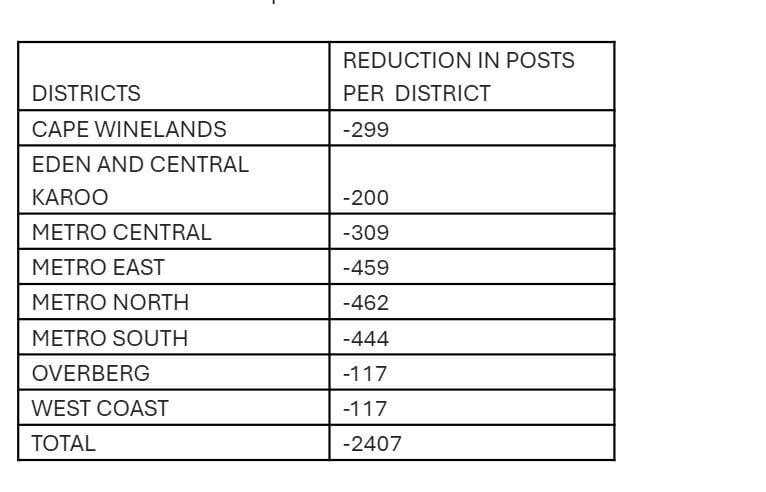Western Cape Education MEC David Maynier announced budget cuts. (Misha Jordaan/Gallo Images)
- The Western Cape Department of Education plans to cut over 2 400 teaching posts in the province in the 2025 academic year.
- The move is due to a national budget shortfall amounting to R3.8 billion.
- Western Cape Education MEC David Maynier announced last week that some contract teachers would not have their contracts renewed.
Cape Town is set to lose a total of 1 674 teaching posts in January next year, while the Cape Winelands district will see 299 teaching post being slashed due to severe budget shortfalls amounting to R3.8 billion.
The Western Cape Department of Education also confirmed that that 200 teaching jobs would be cut in the Eden and Central Karoo district, while the Overberg and West Coast districts will respectively lose 117 teaching posts.
The department has blamed National Treasury for the crisis that has forced provinces to absorb significant budget shortfalls.
Western Cape Education MEC David Maynier said some contract teachers would not be reappointed when the new academic year starts, as their contracts end on 31 December 2024.
“Some permanent teachers will be asked to move to another school where there is a suitable vacancy,” he said.
The Western Cape Department of Education issued a list of the school districts that will be severely affected by job cuts.
They are:
- Cape Winelands – 299;
- Eden and Central Karoo – 200;
- Metro Central – 309;
- Metro East – 459;
- Metro North – 462;
- Metro South – 444;
- Overberg – 117;
- West Coast – 117 posts.
“It is not a decision that has been taken lightly,” Maynier stressed, adding that the budget cuts had placed the province in an impossible situation.
The department said all special needs schools in the province would be protected against job cuts.
READ | DA wants government to find other areas for budget cuts to save teachers’ posts
Metro districts will lose more teachers than teaching districts in rural areas.
“It is not of our making, and the Western Cape is not the only province affected. The decision by the national government to not fully fund the 2023 [public service] wage agreement has caused a fiscal crisis for education departments across the country,” Maynier said.
Even as it plans to cut more than 2 400 teaching posts, the Western Cape Department of Education says it will fight for its teachers to retain their jobs.
“We understand that this will result in difficult choices for our schools. We have been engaging with teachers’ unions in this regard over the past month to ensure that they understand the reason behind this decision,” Maynier said.
He added that they were in this position because the province was being short-changed by the national government, receiving only 64% of the cost of the nationally negotiated wage agreement and leaving it to fund the remaining 36%.
He said:
Despite implementing a drastic R2.5 billion budget cut, including on administration, curriculum and infrastructure, we still face a R3.8 billion budget shortfall over the next three years.
Federation of Governing Bodies of South African Schools CEO Jaco Deacon said it was concerning that the Western Cape would lose teaching posts despite an influx of pupils.
“The educators who are deemed excess will, however, remain at their current schools until they are appointed to vacant posts, which could take a considerable amount of time,” Deacon said.
He said the process of reallocating funding when children move from one province to another was too slow.
“Departmental data from School Realities 2023 illustrates this disparity: The Eastern Cape has 22.28% of our public schools but only 13.61% of our learners, while the Western Cape has 6.53% of schools and 9.44% of learners.”
Deacon said as the number of pupils continues to decline in the Eastern Cape and increase in the Western Cape, state funding must promptly follow the pupils to ensure that provinces can appoint sufficient teachers and build the necessary infrastructure.
Marvin Charles
www.news24.com

